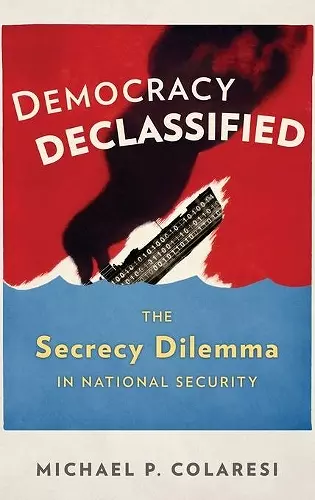Democracy Declassified
The Secrecy Dilemma in National Security
Format:Hardback
Publisher:Oxford University Press Inc
Published:25th Sep '14
Currently unavailable, and unfortunately no date known when it will be back

Democracy Declassified tackles an enduring question of particular current importance: How do democratic governments balance the need for foreign policy secrecy with accountability to the public? Democracies keep secrets both from potential enemies and their publics. This simple fact challenges the surprisingly prevalent assumption that foreign policy successes and failures can be attributed to public transparency and accountability. In fact, the ability to keep secrets has aided democratic victories from the European and Pacific theatres in World War II to the global competition of the Cold War. At the same time, executive discretion over the capacity to classify information created the opportunity for abuse that contributed to Watergate, as well as domestic spying and repression in France, Norway and Canada over the last 40 years. Therefore, democracies face a secrecy dilemma. Secrecy is useful, but once a group or person has the ability to decide what information is concealed from an international competitor, citizens can no longer monitor that information. How then can the public be assured that national security policies are not promoting hidden corruption or incompetence? As Democracy Declassified shows, it is indeed possible for democracies to keep secrets while also maintaining national security oversight institutions that can deter abuse and reassure the public, including freedom of information laws, legislative committee powers, and press freedom. Understanding secrecy and oversight in democracies helps us explain not only why the Maginot Line rose and the French Republic fell, or how the US stumbled but eventually won the Cold War, but more generally how democracies can benefit from both public consent and necessary national security secrets. At a time when the issue of institutional accountability and transparency has reached fever pitch, Democracy Declassified provides a grounded and important view on the connection between the role of secrecy in democratic governance and foreign policy-making.
Democracy Declassified is a superb book that will transform the debate over how democratic governments work in the national security sphere. Michael Colaresi has used careful theorizing, an outstanding series of deeply informative case studies, and beautifully presented quantitative analysis based on original data to evaluate the balance called for between the demands for transparency in democracies and the need for secrecy. Not only does Colaresi explore in a completely original way the balance between secrecy and transparency, he also proposes practical policy solutions to ensure that the right balance is struck... Democracy Declassified is a tour de force in theory development and testing. It should be read by everyone interested in how democracy works or how national security operates. It is a masterful book. * Bruce Bueno de Mesquita, Julius Silver Professor of Politics, New York University *
Democracy Declassified makes a very important and innovative contribution towards understanding international relations in the twenty-first century. Its focus on oversight institutions not only sheds new light on the general connection between domestic political institutions and foreign policy, it also helps frame recent events such as the WikiLeaks and Edward Snowden disclosures. It is essential reading for scholars, students, and policy-makers. * Dan Reiter, Professor of Political Science, Emory University *
Colaresi has written a really exceptional book, which lays solid foundations for an important new research agenda on democracy, secrecy and foreign policy. But Democracy Declassified does much more; in scope, execution and timeliness, it has fundamental implications for various research traditions in political science as well as policy. The mastery of historical detail, care of modeling and attention to detail in its carefully collected new data and analysis make this book an example of the very best scholarship. * Hein Goemans, Associate Professor of Political Science, University of Rochester *
ISBN: 9780199389773
Dimensions: 157mm x 236mm x 36mm
Weight: 635g
394 pages